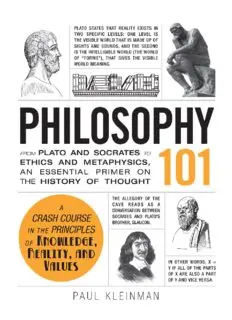
Philosophy 101: From Plato and Socrates to Ethics and Metaphysics, an Essential Primer on the History of Thought PDF
Preview Philosophy 101: From Plato and Socrates to Ethics and Metaphysics, an Essential Primer on the History of Thought
PHILOSOPHY 101 FROM PLATO AND SOCRATES TO ETHICS AND METAPHYSICS, AN ESSENTIAL PRIMER ON THE HISTORY OF THOUGHT PAUL KLEINMAN Avon, Massachusetts CONTENTS INTRODUCTION PRE-SOCRATIC SOCRATES (469–399 B.C.) PLATO (429–347 B.C.) EXISTENTIALISM ARISTOTLE (384–322 B.C.) THE SHIP OF THESEUS FRANCIS BACON (1561–1626) THE COW IN THE FIELD DAVID HUME (1711–1776) HEDONISM PRISONER’S DILEMMA ST. THOMAS AQUINAS (1225–1274) HARD DETERMINISM JEAN-JACQUES ROUSSEAU (1712–1778) THE TROLLEY PROBLEM REALISM IMMANUEL KANT (1724–1804) DUALISM UTILITARIANISM JOHN LOCKE (1632–1704) EMPIRICISM VERSUS RATIONALISM GEORG WILHELM FRIEDRICH HEGEL (1770–1831) RENÉ DESCARTES (1596–1650) A-THEORY THE LIAR PARADOX THOMAS HOBBES (1588–1679) PHILOSOPHY OF LANGUAGE METAPHYSICS JEAN-PAUL SARTRE (1905–1980) FREE WILL PHILOSOPHY OF HUMOR THE ENLIGHTENMENT FRIEDRICH NIETZSCHE (1844–1900) THE SORITES PARADOX LUDWIG WITTGENSTEIN (1889–1951) AESTHETICS PHILOSOPHY OF CULTURE EPISTEMOLOGY TWIN EARTH ARTHUR SCHOPENHAUER (1788–1860) KARL MARX (1818–1883) MARTIN HEIDEGGER (1889–1976) VOLTAIRE (1694–1778) RELATIVISM EASTERN PHILOSOPHY AVICENNA (980–1037) BERTRAND RUSSELL (1872–1970) PHENOMENOLOGY NOMINALISM GOTTFRIED WILHELM LEIBNIZ (1646–1716) ETHICS PHILOSOPHY OF SCIENCE BARUCH SPINOZA (1632–1677) PHILOSOPHY OF RELIGION Copyright INTRODUCTION What Is Philosophy? The very question sounds philosophical, doesn’t it? But what exactly does that mean? What is philosophy? The word philosophy means “love of wisdom.” Indeed, it is a love of wisdom that guides philosophers to explore the fundamental questions about who we are and why we’re here. On the surface, philosophy is a social science. But as you read this book, you’ll discover that it is so much more than that. Philosophy touches on every subject you could possibly think of. It’s not just a bunch of old Greek guys asking each other questions over and over again (though it has its fair share of that as well). Philosophy has very real applications; from the ethical questions raised in government policy to the logic forms required in computer programming, everything has its roots in philosophy. Through philosophy, we are able to explore concepts like the meaning of life, knowledge, morality, reality, the existence of God, consciousness, politics, religion, economics, art, linguistics—philosophy has no bounds! In a very broad sense, there are six major themes philosophy touches on: 1. Metaphysics: The study of the universe and reality 2. Logic: How to create a valid argument 3. Epistemology: The study of knowledge and how we acquire knowledge 4. Aesthetics: The study of art and beauty 5. Politics: The study of political rights, government, and the role of citizens 6. Ethics: The study of morality and how one should live his life If you’ve ever thought, “Oh, philosophy. I’ll never be able to understand that stuff,” then fear not. This is the crash course in philosophy that you’ve always wanted. Finally, you’ll be able to open your mind without making your eyes bleed. Welcome to Philosophy 101. PRE-SOCRATIC The origins of Western philosophy The roots of Western philosophy can be found in the work of Greek philosophers during the fifth and sixth centuries. These philosophers, later referred to as pre- Socratic, started to question the world around them. Rather than attributing their surroundings to the Greek gods, these philosophers searched for more rational explanations that could explain the world, the universe, and their existence. This was a philosophy of nature. Pre-Socratic philosophers questioned where everything came from, what everything was created from, how nature could be described mathematically, and how one could explain the existence of plurality in nature. They sought to find a primary principle, known as archê, which was the basic material of the universe. Due to the fact that not everything in the universe looks the same or remains in the same exact state, pre-Socratic philosophers determined that there must be principles of change that the archê contained. WHAT DOES PRE-SOCRATIC MEAN? The term pre-Socratic, meaning “before Socrates,” was popularized in 1903 by German scholar Hermann Diels. Socrates was actually alive during the same time as many of the pre-Socratic philosophers, and therefore the term does not imply that these philosophies existed prior to those of Socrates. Rather, the term pre-Socratic relates to the difference in ideology and principles. While many pre-Socratic philosophers produced texts, none have fully survived and most of what we understand about the pre-Socratic philosophers is based on the fragments of text that remain and the quotes of later historians and philosophers, which were usually biased. IMPORTANT PRE-SOCRATIC SCHOOLS The Milesian School The first pre-Socratic philosophers existed in the city of Miletus, along the western coast of Anatolia (modern Turkey). From Miletus came three important pre-Socratic philosophers: Thales, Anaximander, and Anaximenes. Thales One of the most important pre-Socratic philosophers, Thales (624–546 b.c.), claimed the archê, or the single element, was water. Thales determined that water could experience principles of change like evaporation and condensation, therefore allowing for it to be gaseous or solid. He also knew that water was responsible for moisture (which heat was generated from) and nourishment. Thales even believed the earth floated on water. Anaximander Following Thales, the next major philosopher to come out of Miletus was Anaximander (610–546 b.c.). Unlike Thales, Anaximander claimed the single element was actually an undefined, unlimited, and indefinite substance, known as apeiron. From this, opposites like moist and dry and cold and hot separated from each other. Anaximander is known for being the first philosopher that we know of to have left writings of his work. Anaximenes The last important pre-Socratic philosopher of the Milesian school was Anaximenes (585–528 b.c.), who believed the single element was air. According to Anaximenes, air is everywhere and has the ability to undergo processes and become transformed into other things, such as water, clouds, wind, fire, and even the earth. The Pythagorean School
